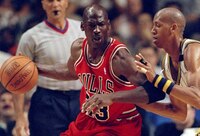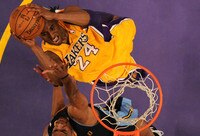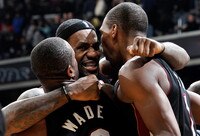The 2012 NBA Playoffs have seen one of the more magical runs in recent memory, with the young Oklahoma City Thunder defeating the past two NBA Champions in convincing fashion. The root of the success has been elevated play from the Thunder's "Core Four," as well as contributions from a rejuvenated second unit.
Regardless of how you cut it, this team is clicking on all cylinders.
While I've never been one to overvalue statistics, the Oklahoma City Thunder are a team whose success can be defined by numbers. In an attempt to prove such a thing, here are the five greatest statistical achievements of the Oklahoma City Thunder's magical title run.
5. The Same Old 3.7

Brett Deering/Getty Images
In the 2012 regular season, 22-year-old Serge Ibaka led the NBA with an astonishing 3.65 blocks per gameâ€"the highest mark since Theo Ratliff's 3.71 in 2001. In the 2012 postseason, Ibaka once again leads all players with a mark of 3.67 swats per contest.
The same old 3.7.
Postseason Mark: Serge Ibaka's 3.7 Blocks Per Game
4. A Five Point Drop

Brett Deering/Getty Images
During Oklahoma City's rocky regular season, the team finished 17th in the NBA by allowing 96.9 points per game. Thus far in the postseason, OKC has turned up the pressure and held opponents to a mere 91.9 points per game.
Only their next opponent, the San Antonio Spurs, have seen a greater drop in points allowed per game.
What's most significant about this defensive pressure is that the Thunder remain near the top of the NBA in terms of points scored per game. This has the Thunder sitting pretty at a point differential of plus-8.1. Third to just the San Antonio Spurs and Miami Heat.
Regular Season Mark: 96.9 points allowed per game
Postseason Mark: 91.9 points allowed per game
3. From 39.4 to 47.2

Ronald Martinez/Getty Images
For those with vivid recollection of the 2011 NBA Playoffs, it's likely that you've yet to erase images of Russell Westbrook taking the most ill-conceived shots in postseason history. If you've watched the 2012 NBA Playoffs, you've noticed two things: Russell Westbrook is a different player and Metta World Peace now owns the previously mentioned negative honor.
Westbrook has transformed as a player, taking high-percentage shots and working off of his teammates to create looks. In games in which he's struggled, which have been very few, he's even learned to pass up the contested J for an open look elsewhere.
Evidence of such a claim can be found in his improvements from 39.4 percent shooting in 2011 to 47.2 percent shooting in 2012.
2011 Postseason Mark: 39.4 FG%
2012 Postseason Mark: 47.2 FG%
2. From 4.6 to 1.6

Brett Deering/Getty Images
Guess who's back?
In the 2011 NBA Playoffs, it was well-documented how heavily criticized Russell Westbrook was for his sloppy and inconsistent play. He constantly turned the ball over due to his tendency to over-dribble, leading to easy points in transition from many an opponent. His average for turnovers per game rested at 4.6.
In 2012, Westbrook looks like an entirely different player as he's shown no hesitation to make the necessary passes to create open looks. More importantly, he's found a way to create his own offense without running his team into the ground.
His turnovers per game mark is now at 1.6 per contestâ€"best amongst all active point guards playing greater than 30 minutes per game.
2011 Postseason Mark: 4.6 turnovers per game
2012 Postseason Mark: 1.6 turnovers per game
1. A Mere 22.5

Three of the Core Four.
Ronald Martinez/Getty Images
The Miami Heat may have their Big Three, but the Oklahoma City Thunder have their own "Core Four"â€"a unit that lacks in experience but is right there in terms of maturity and execution.
While we could utilize the previously listed statistics to define this unit, there is a number that may be the most significant in postseason history. That number is 22.5, which has nothing to do with a statistical achievement that will be listed in the box score.
It's the average age of Kevin Durant, Russell Westbrook, Serge Ibaka and James Harden.
While outliers such as Derek Fisher, age 37, and Nazr Mohammed, 34, increase the average age of this team, it should be noted that including Eric Maynor, this team deploys a rotation in which five of the seven players are under the age of 24.
Should the Oklahoma City Thunder win the NBA Title in 2012, the "Core Four" will go down as one of the most storied title winners in NBA history.
Postseason Mark: Average age of the Core Fourâ€"22.5
Begin Slideshow
Keep ReadingProps (0)
![]()
What is the duplicate article?
Why is this article offensive?
Where is this article plagiarized from?
Why is this article poorly edited?
Flag This Article![]() Oklahoma City Thunder: Like this team?
Oklahoma City Thunder: Like this team?



No comments:
Post a Comment